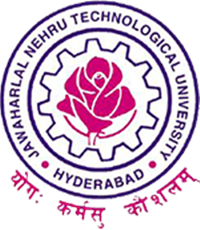JNTUH B.Tech (R25) Academic Regulations With Effect From 2025-26 Onwards

ACADEMIC REGULATIONS FOR B. TECH. REGULAR STUDENTS
WITH EFFECT FROM THE ACADEMIC YEAR 2025-26 (R-25)
Under-Graduate Degree Programme in Engineering & Technology (UGP in E&T)
Jawaharlal Nehru Technological University Hyderabad (JNTUH) offers new regulations termed as R-25 regulations for four-year (eight semesters) Bachelor of Technology (B.Tech.) degree programme, under Choice Based Credit System (CBCS) at its non-autonomous affiliated colleges, with effect from the academic year 2025-26.
Eligibility for admission
- Admissions to the undergraduate (UG) programme shall be made either on the basis of the merit rank obtained by the qualified students at the entrance test conducted by Telangana Government (EAPCET) or the University or on the basis of any other order of merit approved by the University, subject to reservations as prescribed by the government from time to time.
- The medium of instructions for the entire under graduate programme in Engineering & Technology will be English only.
B.Tech. Programme structure
A student after securing admission shall complete the B.Tech. programme in a minimum period of four academic years and a maximum period of eight academic years starting from the date of commencement of first year first semester, failing which student shall forfeit seat in B.Tech. course. Each student has to secure a minimum of 160 credits out of 164 credits for successful completion of the undergraduate programme and award of the B.Tech. degree.
- UGC/ AICTE specified definitions/ descriptions are adopted appropriately for various terms and abbreviations used in these academic regulations/ norms.
Semester scheme
The undergraduate programme is of four academic years and there shall be two semesters in each academic year. There shall be a minimum of 15 weeks of instruction, excluding the midterm and semester-end exams. Around 15 instruction hours, 30 instruction hours and 45 hours of learning need to be followed per one credit of theory course, practical course and project/field-based learning respectively. In each semester, there shall be ‘Continuous Internal Evaluation (CIE)’ and ‘Semester End Examination (SEE)’ under Choice Based Credit System (CBCS). The curriculum/course structure suggested by AICTE is followed as a reference document.
Credit courses
All courses offered in each semester are to be registered by the student. Against each course in the course structure, the L: T: P: C (lecture periods: tutorial periods: practical periods: credits) pattern has been defined.
- One credit is allocated for one hour per week in a semester for lecture (L) or Tutorial (T) session.
- One credit is allocated for two hours per week in a semester for Laboratory/ Practical (P) session.
- One credit is allocated for three hours per week in a semester for Project/Mini-Project session.
For example, a theory course with three credit weightage requires three hours of classroom instruction per week, totaling approximately 45 hours of instruction over the entire semester.
Subject Course Classification
All subjects/courses offered for the undergraduate programme in E&T (B.Tech. degree programmes) are broadly classified as follows.
Course registration
- A faculty advisor / mentor shall be assigned to a group of around 20 students, who will advise the students about the undergraduate programme, its course structure and curriculum, choices/options of the courses, based on their competence, progress, pre-requisites and interest.
- The academic section of the college invites ‘registration forms’ from students before the beginning of the semester through ‘on-line registration’, ensuring ‘date and time stamping’. The online registration requests for semester courses shall be completed two weeks before the commencement of SEEs (Semester End Examinations) of the preceding semester.
- A student can apply for on-line registration, only after obtaining the ‘written approval’ from faculty advisor/mentor, which should be submitted to the college academic section through the Head of the Department. A copy of it shall be retained with the Head of the Department, faculty advisor/ mentor and the student.
- A student shall register for all the courses offered in a semester as specified in the course structure.
- Course options exercised through on-line registration are final and cannot be changed; further, alternative choices also will not be considered. However, if the course that has already been listed for registration by the Head of the Department in a semester could not be offered due to any inevitable or unexpected reasons, then the student shall be allowed to have alternative choice either for a new course (subject to offering of such a course), or for another existing course. Such alternative arrangements will be made by the Head of the Department, with due notification and time-framed schedule, within a week, but before the commencement of classwork of the semester.
- The Head of the Department / Course Coordinator should review vacant slots in the timetable of each section once in every week or fortnight. The vacant slots in the time-table may be allocated to the subject teachers who could not take classes in proportion to the number of weeks completed from the commencement of the semester.
- Two faculty members may be allocated for the tutorial session of Mathematics-1 course for better interaction/practice and to minimise the failures in the subject.
- Professional Electives: The students have to choose six Professional Electives (PE-I to PEVI) from the six baskets of professional electives given. Students have the flexibility to choose from the list of professional electives offered by the Institute or opt to register for the equivalent Massive Open Online Courses (MOOCs) as listed from time to time by the University.
- Open Electives: Students have to choose three Open Electives (OE-I, II & III) from three baskets of Open Electives given by other than the parent department. However, the student can opt for an Open Elective course offered by his parent department, if the student has not not studied that course so far. Similarly, Open Elective courses being studied should not match with any courses of the forthcoming semesters.
Attendance requirements:
A student shall be eligible to appear for the semester-end examinations, if the student acquires a minimum of 75% of aggregate attendance of all the courses for that semester.
Shortage of attendance in aggregate upto 10% (securing 65% and above but below 75%) in each semester may be condoned by the college academic committee on genuine and valid grounds, based on the student’s representation with supporting evidence.
A stipulated fee shall be payable for condoning of shortage of attendance as notified in the respective college websites.
Two hours of attendance for each theory course shall be considered, if the student appears for the mid-term examination of that course.
Shortage of attendance below 65% in aggregate shall in no case be condoned.
Students whose shortage of attendance is not condoned in any semester, are not eligible to take their semester-end examinations of that semester. They get detained and will not be promoted to the next semester. Their registration for that semester shall stand cancelled, including internal marks. They may seek re-registration for that semester in the next academic year.
A student fulfilling the attendance requirement in the present semester shall not be eligible for readmission into the same semester

320-x100(1).gif)

jntuh fee for 1year